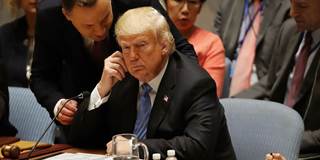The president of the leading global power has made it clear that he has no interest in getting involved in resolving any of the world’s shared problems, dressing up his foreign policy as one of "principled realism." But there is nothing principled or realistic about it.
MADRID – The annual General Debate of the United Nations General Assembly is one of the most notable events on the international diplomatic calendar. As usual, this year’s meeting, during the last week of September, brought together a long list of world leaders, although perhaps the term “world leader” should no longer be used so lightly. The president of the leading global power has made it clear that he has no interest in getting involved in resolving any of the world’s shared problems. Unfortunately, he is not alone.
For those of us who put our faith in international cooperation as a necessary complement to economic globalization, the General Assembly debate revealed a bleak panorama. Certain leaders’ short-term interests, often presented as “national interests,” are one of the factors roiling international relations more than any time since the end of the Cold War. But the rise of nationalist populism is less the cause than the result of rifts that have been forming for some time.
As with any economic process, globalization has a distributive dimension, which means that it is bound to generate frustration for some groups of people. The center of the Western political spectrum has tended to underestimate the impact of rising inequality within countries, focusing instead on the benefits of market opening and integration, such as the unprecedentedly rapid reduction in global poverty. Understandably, however, not everyone is consoled by such outcomes.

MADRID – The annual General Debate of the United Nations General Assembly is one of the most notable events on the international diplomatic calendar. As usual, this year’s meeting, during the last week of September, brought together a long list of world leaders, although perhaps the term “world leader” should no longer be used so lightly. The president of the leading global power has made it clear that he has no interest in getting involved in resolving any of the world’s shared problems. Unfortunately, he is not alone.
For those of us who put our faith in international cooperation as a necessary complement to economic globalization, the General Assembly debate revealed a bleak panorama. Certain leaders’ short-term interests, often presented as “national interests,” are one of the factors roiling international relations more than any time since the end of the Cold War. But the rise of nationalist populism is less the cause than the result of rifts that have been forming for some time.
As with any economic process, globalization has a distributive dimension, which means that it is bound to generate frustration for some groups of people. The center of the Western political spectrum has tended to underestimate the impact of rising inequality within countries, focusing instead on the benefits of market opening and integration, such as the unprecedentedly rapid reduction in global poverty. Understandably, however, not everyone is consoled by such outcomes.